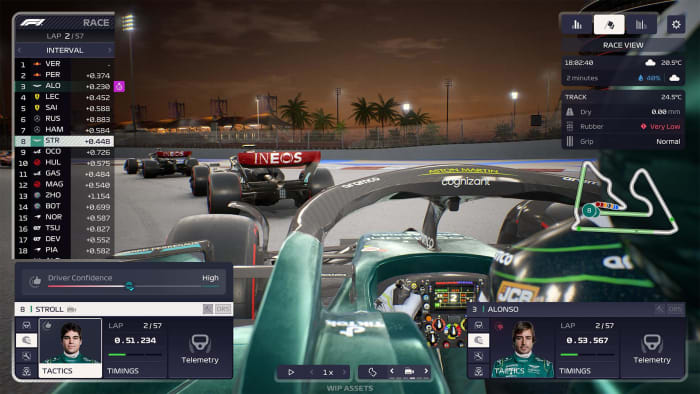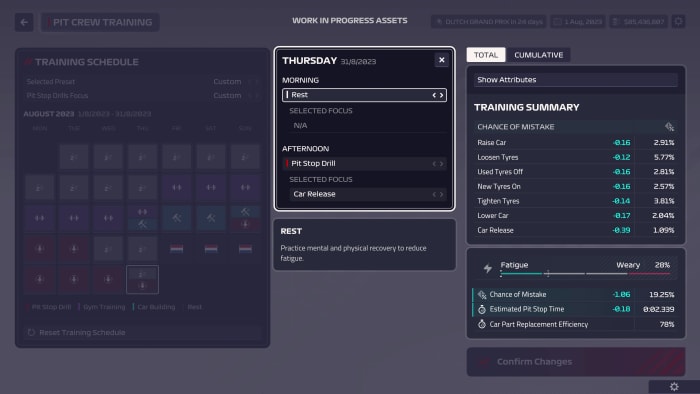F1 Manager 2023 is looking to make a big jump up the grid-order
There was a lot of hype for Frontier’s officially licensed Formula 1 management sim among the racing series’ fans as well as among management game enthusiasts when it landed last year. F1 Manager 2022 had a lot going for it – it’s certainly the best-looking and most immersive sports management title on the market, making fantastic use of its license with the integration of real-life team radio messages and other aspects of F1. Unfortunately, it fell short of expectations when it comes to the actual management and racing part: A clunky UI and faulty mechanics left new players as well as genre veterans frustrated and unsatisfied. Players felt betrayed when the post-launch support failed to address many of their issues, leading to today’s perception of F1 Manager 2022 largely being a missed opportunity.
Just like F1 teams get a fresh shot at jumping up the pecking order in a new season, so does Frontier with F1 Manager 2023. We recently saw a hands-off preview of the game, leaving us cautiously optimistic about the success chances of this restart.
Frontier is doubling down on what F1 Manager 2022 already did well: immersion and authenticity. This year’s car models are all available, all the new tracks are integrated, so you’ll get to play in Las Vegas and Qatar, you’ll get even more – and more varied – real-life radio messages (and even get to listen in on other teams’ comms), and things like sprint races and the alternative qualifying rules being field-tested this season are included, too. Obviously, these have a huge impact on how you approach a race, since sprints are less about pit stop strategy and more about tyre management and balancing of risks.



F2 and F3 are now fully simulated in the game, so you can actually follow your potential recruits from these junior categories and see how they do. Results from these races influence how the young drivers develop their skills, so it’s now worth keeping a keen eye on them as their stats are no longer static blocks. You have another contract option as well now, enabling you to sign a rookie for the end of a season instead of immediately.
Driver development has changed a bit as well, reflecting a more natural process. Instead of manually investing every skill point your pilots earn, you now choose a development focus from several categories. As they gather more experience, they’ll boost their ratings in the skills included in that class. The older a driver gets, the higher do the requirements for them to obtain experience and maintain their current level – someone like Lewis Hamilton needs to regularly bring home points to ensure his ratings don’t decrease. A string of poor performances or a season as reserve driver will have a negative impact on those abilities.
Frontier added more dilemmas for managers to tackle and aims to make them more impactful, which was another bit of community feedback from the first game. There is a new staff position to fill as well: the sporting director. Their role is to oversee the pit crew’s training, which you can now schedule and customize to include training for specific aspects of the pit stop. You’ll need to add rest periods as well, as tired crew members increase the chance of something going wrong during a stop.



Adjustments to how the cost cap is implemented ensure that this is going to become a factor in your decision-making process earlier than was the case in the first game – and it’s noteworthy that Red Bull Racing will start each game in F1 Manager 2023 with a penalty to their wind tunnel time to reflect their breaking of the rules in the previous season.
During car part development, players may now sacrifice some speed for more durability, which is going to be particularly important when you get close to that cost cap – frequent replacements of quick but flimsy components are expensive, after all. This is actually an important point when it comes to game balance. A team like Red Bull will have faster parts, but they’ll need to invest more to maintain them, potentially slowing down their development and giving other teams the chance to catch up.
Collision visuals and physics made a bit of a jump as well from what we saw, and drivers should now take varied racing lines depending on some factors such as their current orders and tyre health, giving everything a more realistic feel. Specifically, wheel-to-wheel battles through corners look a lot more dynamic and natural. A driver’s control stat can now reduce the impact of spins and they’ll try to carry their speed through minor incidents, allowing them to be back on track faster.
Drivers now have a confidence rating based on things like their car set-up, which influences their skill during a race and should inform the orders you give them. Ordering a driver with low confidence in his car to push and overtake may result in undesirable consequences, so you’ll need to weigh if it’s worth the risk or if you can still afford to be a bit more patient and see if the confidence recovers. A new ERS setting specifically for battling other cars has been added, giving you more juice for wheel-to-wheel racing in either direction.
Tyre temperatures – both of the surface and the carcass – are supposed to have more of an impact on tyre life and performance this time around, making it necessary to adapt to track conditions much more. Tyres will also be a lot colder when exiting the pits, so warming them up efficiently will become a must and you’ll need to consider this factor for your pit strategy. The team spent a lot of time balancing this aspect, hoping to provide players with the more fluent, in-depth, and realistic mechanic they were looking for last year.
There are some much-needed quality-of-life improvements as well, such as the ability to actually save the game during a race and a new 3D map of the track allowing you to get a better view of the action. From what we’ve seen, though, there hasn’t been a general overhaul of the UI, which PC players in particular could find annoying.
In addition to the usual career mode, players can expect something fresh and different as well: a mode called Race Replay. It’ll allow players to rewrite key moments of the F1 2023 Season, and while we can’t share more about it at this point, our first impression of it was a promising one.
F1 Manager 2023 looks to play into the strengths of its predecessor and pad out its weaknesses, while clearly sticking to the foundations laid last year. Just like in a F1 race, it all depends on how this will be executed, but Frontier certainly has the right strategy for this restart, which is set to happen in Summer 2023 on PC, PS4, PS5, Xbox One, and Xbox Series X|S.






